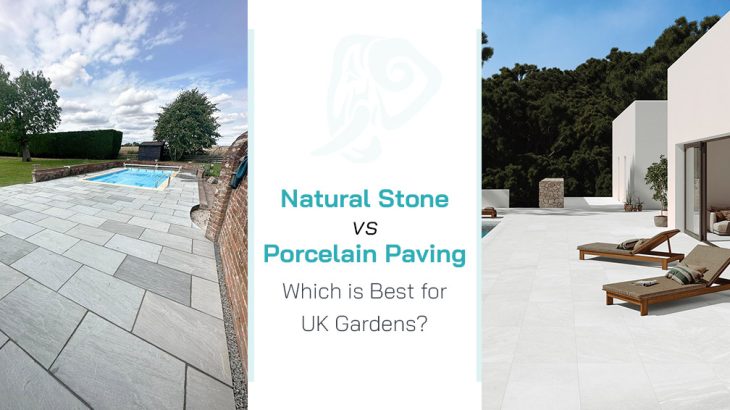When planning a patio or garden makeover in the UK, one of the most important decisions is choosing between natural stone vs porcelain paving. Each option has unique benefits, and the right choice depends on your garden style, climate considerations, and maintenance preferences. Let’s explore both materials to help you decide which is best for UK gardens.
Natural Stone Paving
1. Appearance and Aesthetics
Natural stone paving offers character and individuality. Each slab is unique, with tone, veining, and texture variations. This makes it an excellent choice for traditional and rustic gardens, especially in heritage settings. Popular options such as Indian sandstone slabs, limestone, and slate are admired for their timeless charm and ability to blend seamlessly with greenery and older properties.
2. Durability in UK Weather
Natural stone is durable, but it varies depending on the type you choose. Granite and slate, for instance, perform exceptionally well against frost and heavy rain, while some lighter sandstones are more porous and may need sealing. Without proper care, natural stone can absorb moisture, leading to staining or frost damage over time.
3. Maintenance Needs
Stone paving usually requires sealing to prevent moss, algae, and staining, especially in damp British gardens. Regular cleaning and treatment help keep the slabs looking their best. While this may mean more upkeep, many homeowners appreciate the patina that stone develops as it weathers.
4. Safety and Practicality
Riven and textured natural stone surfaces provide good slip resistance, which is important in wet weather. However, algae can build up if maintenance is neglected, making some surfaces slippery. Choosing a textured finish and keeping up with cleaning reduces this risk.
5. Cost Considerations
The price of natural stone varies widely. Premium materials can be costly, and installation can be more labour-intensive compared to man-made alternatives. Over time, the need for sealing and maintenance should also be factored into the total cost.
When to Choose Natural Stone:
- You want a traditional, characterful look.
- You appreciate materials that age naturally.
- Your garden design includes patio slabs, garden slabs, or exterior wall cladding that benefit from stone’s variation.
Porcelain Paving
1. Appearance and Style
Porcelain paving is manufactured to deliver consistency in size, colour, and finish. Modern techniques allow it to mimic natural stone, wood, or concrete. Many UK homeowners are drawn to wood-effect paving slabs or sleek contemporary porcelain tiles that complement modern properties.
2. Weather Resistance in the UK
One of porcelain’s biggest strengths is its resilience. It is non-porous, which means it resists moisture absorption, stains, and frost damage far better than many types of stone. This makes it particularly suitable for the damp and unpredictable British climate.
3. Maintenance Benefits
Unlike natural stone, porcelain paving does not require sealing. Its smooth, non-porous surface makes it resistant to moss, algae, and stains. Cleaning is straightforward, usually requiring only water and mild detergent. For busy households, this low-maintenance quality is a key advantage.
4. Safety and Slip Resistance
Although porcelain has a smooth finish, many outdoor ranges are designed with slip-resistant textures. This makes them safe for patios, garden paths, and outdoor entertaining areas, even in wet conditions.
5. Cost and Long-Term Value
Porcelain paving can have a higher initial cost than entry-level natural stone, but it often pays off over time thanks to its durability and low maintenance needs. The installation process is generally simpler, as porcelain slabs are uniform in thickness and size.
When to Choose Porcelain:
- You want a sleek, modern aesthetic with consistent finishes.
- You prefer low maintenance and long-lasting materials.
- You’re interested in outdoor tiles or seamless designs that extend indoor flooring to patios.
Which is Best for UK Gardens?
Ultimately, the decision between natural stone vs porcelain paving depends on your lifestyle and design goals.
- Choose natural stone paving if you love unique, organic textures and don’t mind carrying out maintenance to preserve its beauty. It works beautifully with traditional gardens and heritage properties.
- Choose porcelain paving if you value ease of cleaning, resistance to frost and stains, and a contemporary look. It’s often the more practical option for modern UK homes.
Whichever option you choose, ensure you buy from a reliable paving slabs store. Quality products make a real difference to how your patio or garden performs in the long term, so it’s worth investing in trusted suppliers.
Conclusion
There is no one-size-fits-all answer to the question of which is best for UK gardens. Natural stone brings timeless charm and individuality, while porcelain paving delivers durability, low maintenance, and sleek modern style. By considering your property’s design, your budget, and how much maintenance you’re prepared to do, you can make the right choice and enjoy a stunning, long-lasting outdoor space.
